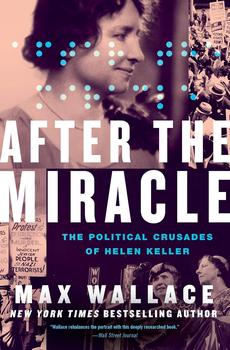Summary | Excerpt | Reviews | Beyond the Book | Readalikes | Genres & Themes | Author Bio

The Political Crusades of Helen Keller
by Max Wallace
Next, Howe directed Lydia Drew—one of many female teachers who worked closely with Laura—to teach her the manual alphabet, a method that he had first observed while visiting Julia Brace at the Hartford Asylum. The relatively simple technique involved presenting Laura with an object and then spelling its name into the palm of her hand. The speed at which she picked up finger spelling was astonishing to Howe and her teachers. "She signs words and sentences so fast and dexterously that only those accustomed to this manual language can follow with the eye the rapid motions of her fingers," he noted. The teachers often noticed her sitting alone entertaining herself by conducting imaginary dialogues or practicing her spelling.
Watching her practice the manual alphabet for hours on end, he soon noticed a peculiar habit that illustrated the diligence she applied to her learning. "If she spells a word wrong with her right hand," he observed, "she instantly strikes it with her left, as her teacher does, in a mark of disapprobation."
Howe would later admit that the process of building on each learning success was "slow and tedious," not least because there were no precedents from which to draw. He confided his disappointment that, by the age of nine, after two years of instruction, Laura had only acquired the language skills of the average three-year-old. From the promise she had shown early on, he had clearly expected her to develop at a quicker pace. Still, by age eleven, her progress had reached the point that she was able to take her place in a classroom with the other blind students, while a specially assigned teacher spelled the lessons into her hand. Eventually, she would master a number of complex subjects, including math and philosophy. Long before that, however, Laura Bridgman had already become a household name and her achievements heralded as a "miracle" thanks to the breathless media coverage engineered by her mentor, whose reputation became inextricably tied to the "deaf, dumb, and blind girl from New Hampshire."
Within a year of Laura's arrival, Howe used the Perkins annual reports to trumpet her progress and paint an exaggerated and somewhat idealized portrait, despite his aforementioned disappointment about the pace of her development. In charting the trajectory of Laura's fame, Ernest Freeberg compares Howe's publicity skills to the legendary nineteenth-century huckster P. T. Barnum, who famously shaped the narrative to make stars of his attractions. "No less than Barnum," he wrote, "Howe mastered the art of manipulating the public's interest in her story ... in order to advance his career and his institution." Describing her as a very "pretty, sprightly and intelligent" girl deprived of her senses since infancy, Howe likened her mind to a "closed tomb at midnight" before he opened it up with his noble experiment.
For readers who had previously assumed that deafblind people were uneducable, his inflated description of her rapid progress and mastery of the manual alphabet in a short four months caused an immediate sensation. The popular press reprinted his accounts and, before long, Laura Bridgman had become a household name in America.
Eager to take advantage of her newfound celebrity, Howe revived a technique he had used to great effect during the earliest days of his school. He placed her on public exhibit to showcase her astonishing progress—arguing that such displays would increase interest in the education of blind children and "loosen the public and private purse strings." Every month, hundreds of visitors flocked to Perkins desperate to get a glimpse of the prodigy. With a green ribbon wrapped around her eyes to cover her "deformity," Laura sat at a desk on full display on the lawn of the institute while the ever-expanding crowds watched her reading books with raised type, knitting, and finger spelling into a teacher's hand. Many poured forward demanding her autograph or pieces of her needlework. Some even asked for locks of her hair.
Excerpted from After the Miracle by Max Wallace. Copyright © 2023 by Max Wallace. Reprinted with permission of Grand Central Publishing. All rights reserved.
The only real blind person at Christmas-time is he who has not Christmas in his heart.
Click Here to find out who said this, as well as discovering other famous literary quotes!
Your guide toexceptional books
BookBrowse seeks out and recommends the best in contemporary fiction and nonfiction—books that not only engage and entertain but also deepen our understanding of ourselves and the world around us.